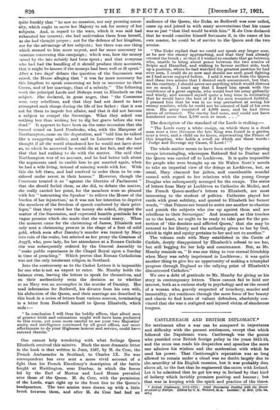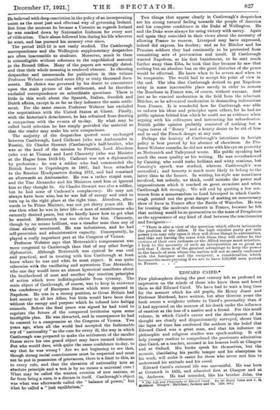CASTLEREAGH AND BRITISH DIPLOMACY.*
No- settlement after a war can be compared in importance and difficulty with the present settlement,. except that which followed the Napoleonic wars. Castlereagh was the genius who. presided over British foreign policy in the years 1813-15; and the more one reads his despatches and speeches the more one admires- his wisdom and the moderation with which he used his power. That Castlereagh's reputation was so long allowed to remain under a cloud was no doubt-largely due to the.scurrility of his English enemies, but it- was probably due; above all, to the fast•that he-engineered the-union with Ireland. Let it'be admitted. that he got his way in Ireland by that kind of bribery which lavishly promises position and honour ; but that was in keeping with the spirit and practice of the times.
• British Di , 1813-1815 Select Documents Darting with the Remo• strurtgar of Balms: - brC;-1E. Webster,11.A. Lontloir: GI: Bell. (12s. ed. net.1
Ile believed with deep conviction in the policy of an inoorporating union as the most just and effectual way of governing Ireland.
But from the moment he became a Unionist as regards Ireland he was marked down by Nationalist Irishmen for every sort of vilification. Their abuse followed him during his life wherever he went, and has pursued his memory ever since.
The period 1813.15 is not easily studied. The Castlereagh correspondence and the Wellington supplementary despatches are often inaccessible to students. Moreover, much in them is unintelligible without reference to the unpublished material in the Record Offioe. Many of the papers are wrongly dated, and thus their whole meaning is rendered obscure. In choosing despatches and memoranda for publication in this volume Professor Webster consulted some fifty or sixty thousand docu-
ments. His choice was governed by his desire to concentrate
upon the main picture of the settlement, and he therefore excluded correspondence on subordinate questions. There is little in this work about the Spanish, Italian, Swedish and Dutch affairs, except in so far as they influence the main settle- ment. For the same reason Professor Webster has excluded the negotiations with the United States at Ghent. Finally, with the historian's detachment, he has refrained from drawing a comparison with the events of to-day. By what may be called lucid selection he has simply provided the material so that the reader may make his own comparisons.
The majority of the despatches quoted were exchanged between Castlereagh, Lord Cathcart (who was Ambassador in Russia), Sir Charles Stewart (Castlereagh's half-brother, who was at the head of the mission to Prussia), Lord Aberdeen (who was at Vienna) and Lord Clancarty (who was Minister at the Hague from 1813-14). Cathcart was not a diplomatist by profession ; he was a soldier who had commanded the British forces in Copenhagen in 1807, had been attached to the Russian Headquarters during 1912, and had remained on afterwards as Ambassador. He was a rather stupid man, and the Tsar Alexander and his Ministers used him or ignored him as they thought fit. Sir Charles Stewart was also a soldier, but he had none of Cathcart's complacency. He may not always have been wise, but he was full of energy and used to turn up in the right place at the right time. Aberdeen, after- wards to be Prime Minister, was not yet thirty years old. He was then what he was in later life—a man of sensitiveness who earnestly desired peace, but who hardly knew how to get what he wanted. Metternich was too clever for him. Clancarty, though by no means brilliant, was a steadier man than any of those already mentioned. He was industrious, and he had self-possession and administrative capacity. Consequently, he played a really important part at the Congress of Vienna.
Professor Webster says that Metternich's temperament was more congenial to Castlereagh than that of any other foreign diplomatist. Although Metternich was cynical he was cool and practical, and in treating with him Castlereagh at least knew where he was and what he must expect. It was quite otherwise with the vacillating and mysterious Tsar Alexander, who one day would issue an almost hysterical manifesto about the brotherhood of man and another day sanction principles of action which were indistinguishable from tyranny. The main object of Castlereagh, of course, was to keep in existence the confederacy of European States which were opposed to Napoleon. He was in a strong position, as Great Britain had lent money to all her Allies, but little would have been done without the energy and purpose which he infused into haltipg counsels. Before the final peace was signed he had tried to regulate the future of the conquered territories upon some Intelligible plan. He was thwarted, and in consequence he had to consent to a compromise at the Congress of Vienna. Two years ago, when all the world had accepted the fashionable cry of " nationality " as the cure for every ill, the way in which Castlereagh was prepared to make the settlement of the smaller States serve his one grand object may have seemed inhuman. But who would dare, with quite the same confidence to-day, to say that he was wrong ? Are we not beginning to see that, though strong racial consciousness must be respected and must not be put in possession of grievances, there is a limit to this, as to every rule, and that the elevation of nationality into an absolute principle and a test is by no means a universal cure ? What may be called the wanton creation of new nations, so far from being a cure, is a disease in itself. Castlereagh's object was what was afterwards called the " balance of power," but what he called a " just equilibrium," Two things that appear clearly in Castlereagh's despatches are his strong natural feeling towards the people of America and his complete confidence in the Duke of Wellington. He and the Duke were always for using victory with mercy. Again and again they coincided in their views about the necessity of allowing France to recover. Liverpool may have expressed, indeed did express, his doubts ; and as for Blucher and his Prussian soldiers they had continually to be prevented from committing acts of provocation and insult. If Castlereagh wanted Napoleon, at his first banishment, to be sent much further away than Elba, he took that line because he saw that nothing but an absolute ban on the great disturber of the peace would be effectual. He know when to be severe and when to be temperate. The world had to accept his point of view in the end. The idea that Castlereagh desired to put Napoleon away in some inaccessible place merely in order to restore the Bourbons in France was, of course, without warrant. And just as he exacted moderation in the field from the reluctant Blucher, so ho advocated moderation in demanding indemnities
from France. It is wonderful how far Castlereagh was able to enforce his ideas and principles upon others, for he had no public opinion behind him which he could use as evidence when arguing with his colleagues and instructing his subordinates. British public opinion probably consisted of nothing but a
vague terror of " Boney " and a hearty desire to ho rid of him and to end the French danger at any cost.
Perhaps the honesty of Castlereagh's intentions in foreign policy is best proved by his absence of showiness. As Pro- fessor Webster remarks, he did not write with his eye on posterity as Metternich and Talleyrand wrote. His public speaking had much the same quality as his writing. He was overshadowed by Canning, who could make brilliant and witty orations, but Canning's speech was studied, whereas Castlereagh's was unstudied ; and honesty is much more likely to belong to tho latter than to the former. In writing, his style was sometimes involved, but nobody, we think, could mistake the power and impressiveness which it reached on great occasions and when Castlereagh felt strongly. We will end by quoting a few sen- tences from a memorandum to Lord Liverpool in which Castle- reagh pointed out the great danger of making an unnecessary show of force in France after the Battle of Waterloo. He was for trusting the moderate elements in France, because he felt that nothing would be so provocative to the mass of Frenchmen as the appearance of any kind of deal between the reactionaries and foreigners:—
" There is also a view of the question which affects intimately the position of the Allies. If the high royalist party got into power you may rely upon it they will drive things to extremities, and that not having the mass with them they will either be the victims of their own rashness or the Allied troops must interfere. I look to the necessity of such an interposition as so groat an evil that I deem it of the greatest advantage to keep the power in the hands of men whom the nation will not so easily confound with the foreigner and the emigrant, a consideration which becomes the more pressing if we are to have 150,000 men posted
in France. . ."







































 Previous page
Previous page